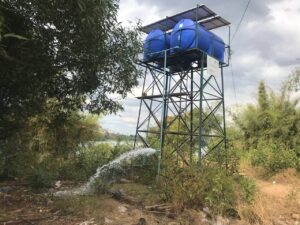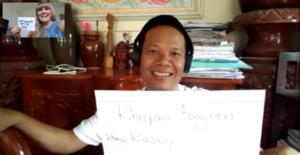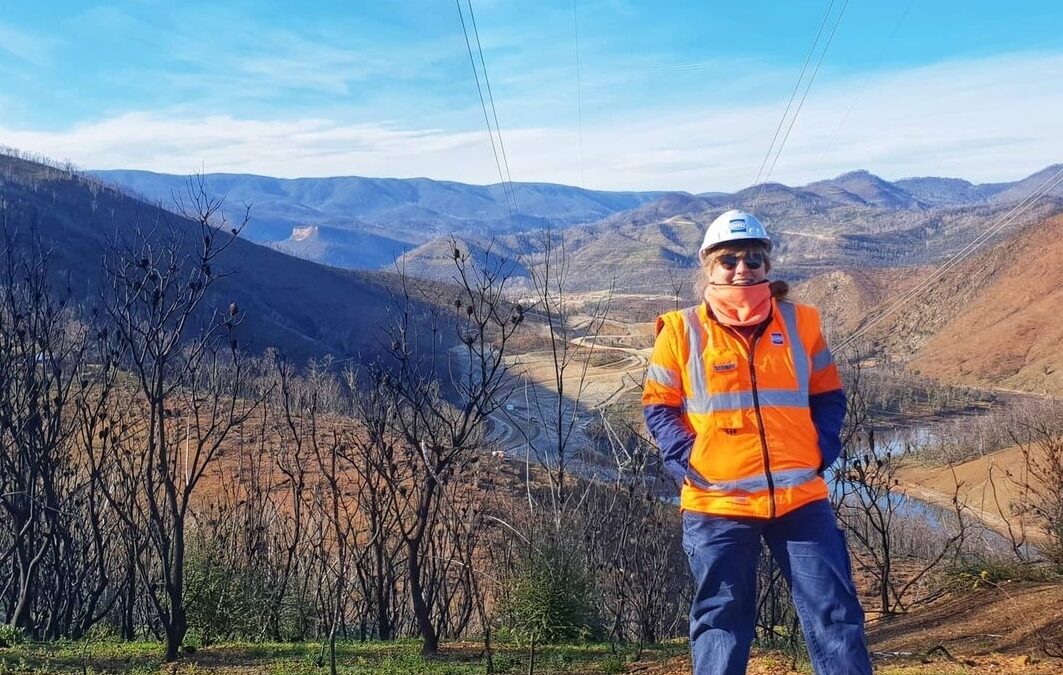Most high school students walk away from university open days with a bunch of flyers, drink bottles and a show bag from the snow club. Kasey Williams certainly did too, but she also gained valuable insight into the flourishing world of humanitarian engineering.
Kasey sat in a lecture theatre at the University of Newcastle, hearing about the opportunities to use environmental engineering to improve the lives of communities across the world. One of these opportunities involved improving water quality in Cambodia. Kasey always had a passion to help others, but hearing first-hand how her studies could combine with this passion was exciting.
Kasey is an Environmental Operations Officer at the NSW EPA and an EWB Australian Volunteer Professional. The Australian Volunteers Program supports EWB in matching skilled engineering professionals to contribute to our work in developing countries. This supports communities to achieve their development goals. Due to COVID-19, Kasey is supporting this work remotely.
Engineering imagination to reality
In September 2020 Kasey’s thoughts in the lecture theatre became a reality, beginning a role as an EWB field professional with the Cambodian Rural Development Team (CRDT).The partnership supports three communities in Cambodia’s Kratie Province improve their water supply systems for drinking, house-work and farming. The project built upon a report developed as part of EWB’s Solutions for Sustainable Development Intensive field trip in 2019. The report identified problems with water supply infrastructure and community management of the original water supply system built in 2016.
“Engineering in an Australian industrial context is generally about devising the most effective solution within a given time and budget,” Kasey explains. “But my work with EWB has encouraged me to consider many more social factors in my work and the indirect impacts our decisions may have. I’ve learnt that a one size fits all approach is not appropriate and that collaboration is key.”
Empowering communities for the long term
Engineering technology is only one aspect for improving water supply in the Kratie Province. The project empowers communities to strengthen their technical and professional skills to support the water supply system for the long term.
Mariny Cheang is the Technology Development Specialist for EWB Australia in Cambodia. Specialising in water treatment, air pollution and hydrology, Mariny is working with Kasey and the CRDT on the project.
“It’s very important to strengthen the capacity of the local community in terms of technical and professional skills,” Mariny explains. “It is a long term solution to improve the water supply system because when some parts of the water supply system are broken or malfunctioning, the local community needs to be able to repair it themselves. It saves time and money by avoiding the need to send the spare part away to have it fixed by a mechanic.”

Water supply system in Kratie Province community
This community-centric approach also adresses education and literacy skill development in the Kratie region.
“Community members can then share their technical knowledge with others in the community to sustain the maintenance and operation of the system.”
The water supply system provides easy access to treated drinking water for households. The filtration system uses local materials such as sand and gravel, which avoids the use of diesel generators to pump water from the river. This reduces the community carbon footprint.
Engineering supporting women
The system has reduced the workload of women and children who collect water from the river, which becomes particularly difficult in summer.
“The project has had a major impact on community members, especially women who are housewives that use a lot of water per day compared to other family members,” Mariny explains. “The water supply system is also one part of improving people’s health and dignity. Women and children usually wash their clothes in the river bank and bathe there so the system supports the privacy adult women.”
Kasey is passionate about female representation in engineering. Through her own experience, Kasey has seen the negative impact of male-dominated workplace environments. Kasey wants female representation to not just satisfy a quota, but be a norm in the engineering industry.
“I hope that the mark my colleagues and I make on the world inspires more females to consider a career in engineering or STEM,” Kasey says.
In both community and professional workplace environments, Kasey is driven to improve the experiences of women in engineering.
“As a female in a junior-mid level point of my career, I have experienced a lot of negativity and unacceptable comments/behaviours in the workplace,” she explains. “Whilst this can be incredibly intimidating, I hope that by standing up to people and more importantly educating them, the next generation of female engineers can be treated equally and allowed to just ‘get on with the job’. They shouldn’t have to consider how being a female may impact their role.”
Overcoming COVID-19 challenges
In September 2021, Mariny and Kasey will have been working remotely together for one year. They are eagerly awaiting for the day they can work together on the project in person. Time differences, a global pandemic and work and family commitments are just some of the challenges that come with working remotely. To stay connected the team holds weekly meetings to update on progress and create solutions. Beyond meetings, Kasey and the team send photos of their weekend and GIFS. For Khmer New Year, Kasey, Mariny and their colleagues Pin and Rika, sent photos of their Buddhist offerings they had set up in their homes due to COVID-19 lockdowns.
This is just a small part of Kasey’s efforts to engage with her Cambodian colleagues and project communities. Kasey also takes weekly language lessons to learn Khmer, the official language of Cambodia.

Kasey learning Khmer with language instructor Dara
“It allows us to converse and have a laugh when I make a mistake or my pronunciation is a little unintentionally off,” she explains. “I was able to introduce myself briefly at a recent PDRD meeting where the PDRD reps did not speak English.”
Kasey believes she has become more flexible, adaptive and resourceful as an EWB field professional. The communities in the Kratie Province don’t have the technical and material resources that are readily available to engineers in Australia. This contrast has developed Kasey’s critical thinking skills, helping her in the workplace.
“I try to focus on doing things that I care about and am passionate about, to make a positive impact on the world around me”.
It is undeniable that Kasey is fulfilling her goals. But most importantly, once Kasey eventually gets to Cambodia’s capital Phnom Penh, lunch is on Mariny.


